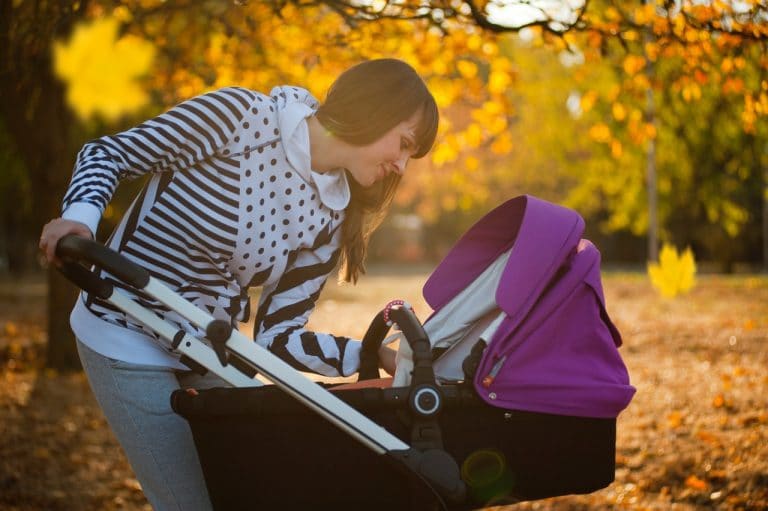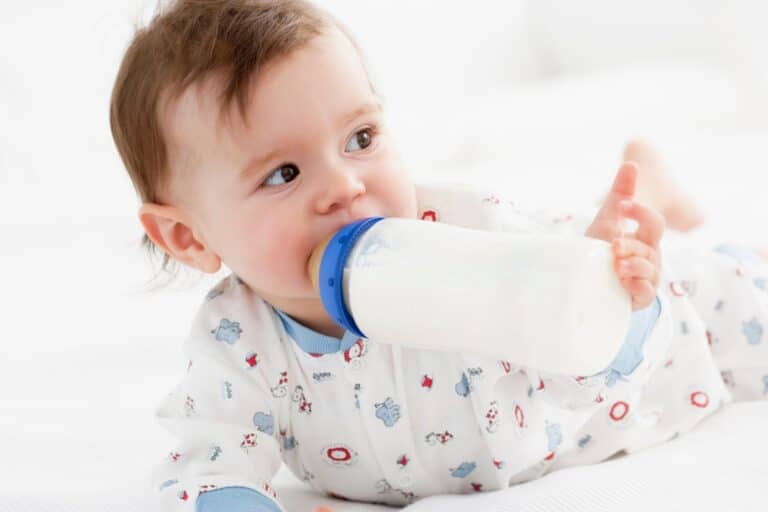Do you have a colicky baby? If so, you’re probably desperate for any advice that might help calm your little one. One of the most common pieces of advice is to adjust your baby’s sleeping position. But what is the best sleeping position for a colicky baby? Check out the information below to learn more.
Colic is a condition in which an otherwise healthy baby cries hard and frequently for no apparent reason. A colic baby can cry for several hours at a time, and this can be very distressing for both baby and parents. According to a study, sudden infant death syndrome (SIDS) in colic babies is four times higher than in a non-colic baby. Babies with colic are also at a higher risk of developing gastroesophageal reflux disease (GERD).
Generally, to sleep, a baby should be put on his or her back on a firm surface. You can use a crib, bassinet, or playpen for this purpose. Some parents believe that sleeping on the stomach is better for colic babies, but there is no scientific evidence to support this claim. In fact, sleeping on the stomach can increase the risk of SIDS. In this blog post, we will discuss the best sleeping position for a colic baby and how you can help your little one get some much-needed rest.
In This Article
What is the ideal sleeping position for a colicky baby?
If your baby has colic, you might be wondering if there is a way to ease their discomfort. One method that some parents find helpful is to change the way their baby sleeps. Some parents believe that the best sleeping position for a colicky baby is on their stomach. There is no scientific evidence to support this claim, but some parents find it helpful.
Stomach/Side-sleeping may help colicky babies by preventing them from swallowing air and improving digestion. Always place your baby on his or her back to sleep to reduce the risk of SIDS. Make your colic baby sleep on the side, which may help to ease discomfort and reduce crying. A study found that babies who slept on their side had shorter and less severe bouts of colic than those who slept on their back.
Some parents find that placing their baby on their stomach or side in a semi-upright position helps to ease gas and pressure build-up that can contribute to colic pain. Others find that holding their baby close in a reclining position is most effective. Generally, baby sleep positioners are not recommended for colicky infants.
However, some doctors may suggest placing your baby on his or her side or stomach during sleep to help relieve symptoms. Ultimately, it’s important to experiment with different positions until you find the one that works best for your baby. If you’re struggling to get your colicky baby to sleep, talk to your doctor or lactation consultant for more specific tips and guidance.
What are the Five S strategies for a baby with colic?
Though it is best for your baby to remain upright for at least 30 minutes after a feeding, there are other ways to soothe your baby’s discomfort. The baby may be held in a semi-upright position and you can also use a pacifier. If you are breastfeeding, you can try different positions such as the clutch hold or football hold. You can also try using white noise or music to soothe your baby. The “5 S’s” are five simple yet effective strategies for calming a colic baby:
1. Swinging
Swinging is that your baby with colic in a rhythmic back-and-forth motion. This can be done in a baby swing or even by gently bouncing your baby on your knee. This is one of the methods to your baby with colic that is most commonly recommended by pediatricians. Swinging are tips to soothe a colic baby that can be used in combination with other methods.
2. Swaddling
Swaddling is wrapping your baby snugly in a blanket. This can help your baby feel secure and safe, and it may remind them of being in the womb. Swaddling is often recommended as one of the best ways to soothe a colic baby. Furthermore, it can help your baby to sleep for longer periods of time.
3. Shushing
Shushing is another one of the most popular strategies for calming a colic baby. The sound of white noise can help soothe and calm your baby. You can do this by placing your baby in a car seat or swing and turning on a fan or hair dryer, running the vacuum cleaner, or playing recorded white noise. Moreover, for your baby, you can try making shushing noises yourself.
4. Sucking
Sucking can help to relieve the discomfort of gas and soothe your baby. This can be done by offering your breast or a pacifier. If you are breastfeeding, you may need to try different positions to find one that is comfortable for both you and your baby. It is important to stay calm when feeding your baby, as this can help them to relax and suck more effectively.
5. Stomach/Side-Lying
Putting your baby in the side or stomach position can help to ease the discomfort of gas and relieve pressure on the tummy. When your baby is not sleeping, you can hold them in this position while they are awake. Be sure to never leave your baby unattended while they are in the side or stomach position.
How do you know if your baby has colic?
There are some signs that may help you to identify if your baby has colic, these include:
- Your baby cries for more than three hours a day, for three or more days in a row.
- The crying usually starts in the late afternoon or evening.
- Your baby’s face turns red and he or she may clench their fists when they cry.
- Your baby may pull their legs up to their chest and pass gas.
- Crying bouts are often followed by a period of contentment.
What is the main cause of colic in babies?
Additionally, a baby with colic may cry for long periods of time without any clear reason. However, there are several theories about what may contribute to it. So look at below to know more about the cause of colic in babies.
1. An infection
Colic could be caused by an infection, such as a viral infection. It’s also possible that your baby has an intolerance to something in your breast milk or formula. Infection is more likely to be the cause of your baby having other symptoms, such as a fever, diarrhoea, or vomiting.
2. Overfeeding
It’s possible that your baby is overfed, which can cause colic. When a baby is overfed, they may swallow a lot of air, which can lead to gas and pain in their tummy. As well, while breastfeeding, your baby may eat too fast and gulp down air. To prevent overfeeding, watch for cues that your baby is full, such as turning their head away from the breast or bottle.
3. Reflux
Reflux happens when stomach contents, including acid, flow back up into the oesophagus. This can cause your baby to cry because it hurts. Reflux is more likely to be the cause of your baby’s pain if they also vomit or spit up often. Moreover, recurrent ear infections could also indicate that your baby has reflux. Also, it’s more likely to be the cause if your baby is fussy after eating.
4. Food allergies
Certain foods that you eat while breastfeeding can cause colic in your baby. For example, if you eat dairy products, your baby may be intolerant to lactose and develop gas and pain. Common food allergens that can cause colic include dairy, soy, wheat, eggs, peanuts, and tree nuts. Furthermore, artificial additives, such as colourings and flavourings, may also be to blame.
5. Milk-protein intolerance
A small number of babies are sensitive or intolerant to the proteins found in cow’s milk. This can cause an immune reaction, resulting in inflammation and tummy pain. If you think your baby may have a milk protein allergy or intolerance, talk to your doctor. They may recommend switching to a hypoallergenic formula or a hydrolysed protein formula.
6. Immature Digestive system
The most common theory is that colic is caused by gastrointestinal discomfort. This means that the baby’s digestive system is still maturing and they are unable to process certain foods properly. As a result, they experience pain and other symptoms associated with colic.
Why is colic worse at night for babies?
There are a few reasons why colic is worse at night for babies. First, babies are often more tired at night, which can make them more prone to crying. Second, there may be less noise and activity during the nighttime hours, which can make any cries or fussing seem louder. Lastly, it can be harder for parents to cope with a crying baby at night when they are also trying to get some rest. Thankfully, there are some things that parents can do to help soothe a colicky baby, such as holding them close, rocking them gently, or playing soft music. With time and patience, most babies will outgrow their colic and start sleeping through the night again.
How many hours does colic last?
Colic typically lasts for 3-4 hours at a time and usually happens in the late afternoon or early evening. It can be frustrating for both baby and parents, but try to remember that it is temporary and will eventually end. Some things that may help reduce the duration of colic include burping often during feedings, using a pacifier, rocking or soothing music, and lightly massaging your baby’s tummy. If you’re ever concerned about your baby’s excessive crying, be sure to speak with your pediatrician.
Do colic babies fart a lot?
All babies fart, but colic babies seem to fart more because of all the stomach gas they produce. Babies expel a lot of gas in the early weeks and months because their immature digestive system is still learning how to break down food properly. Colic babies, however, tend to have more gas than other babies because they have trouble digesting milk proteins and lactose. As a result, they produce more air and gas in their intestines, which often comes out as flatulence.
Does gripe water help with colic?
Yes, gripe water can be helpful for relieving colic in infants. Colic is typically characterized by uncontrollable crying and fussiness, and it can be very distressing for both babies and parents. Gripe water is a mess-free, easy-to-use remedy that can provide some relief from the symptoms of colic. It contains natural ingredients like ginger and fennel which have been traditionally used to soothe the digestive system. When given before or during feeding, gripe water can help relax the muscles in the gut and ease discomfort. It can also be given after a feeding to help expel any air bubbles that may have been swallowed during nursing.
The Bottom Line
If your baby with colic is having trouble sleeping, you may want to experiment with different sleeping positions. Some parents find that their baby sleeps best on their stomach or side, while others find that the crib or bassinet works best. Although it is not conclusive, the best sleeping position for colic babies appears to be on their left side. If you are struggling with a colicky baby, try putting them to bed in this position and see if it helps. Remember to keep an eye on your little one and consult with your pediatrician if you have any concerns. We hope this article was helpful, if you have any questions or comments please leave them below! Thank you for reading!










![Home Renovation Guide [2025]](/app/uploads/2021/04/design-hacks-1-378x300.jpg)
